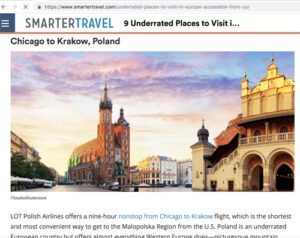
One year into a new SEO strategy, SmarterTravel is seeing traffic increases of up to 70 percent for some brands.
SmarterTravel is the media arm of TripAdvisor and operates several different websites, each catering to a different type of travel audience. AirfareWatchdog.com, for example, offers information on travel deals, while Jetsetter.com shares intel on the hottest global destinations.
“Depending on what a user is looking for in their travel journey, we want to offer content to help them figure out where they want to go or find things to do at their destination,” says Melissa Sciorra, senior manager of SEO at SmarterTravel.
Before she joined the Boston-based company last summer, SmarterTravel had never focused on SEO. The company was acquiring traffic through paid acquisition and a robust CRM and email program. While editorial had some natural SEO baked in, no effort was being made to optimize content for search.
Her first job was to help the various brands’ editors understand the basics of SEO.
“We created a task force with an editorial lead from each of the brand websites,” she says. “These are the people I’m teaching how to fish. I’m dropping all of my knowledge on them and they share it with their teams.”
Coming in with a clean slate was a huge opportunity to hit the ground running, she says. An internal wiki was created to answer terminology and best practices questions quickly, and a variety of keyword research tools were implemented. All the hard work paid off, with traffic increases spiking upwards of 70 percent, translating into millions of visits.
“Because we have so much content on our site, and our domains are so old and we have great domain authority, these slight changes that we were making to topic and keyword selection made an impact quickly,” says Sciorra, who will be a featured speaker at LeadsCon’s Connect to Convert, Sept. 25-27.
You May Also Enjoy:
For millions of keywords, SmarterTravel’s sites average page one and page two on Google. What performs best varies from brand to brand. On Oyster.com, risqué content such as “what to bring to a nudist resort” or “hotels that make you feel sexy” does well. On the flagship SmarterTravel.com portal, more utilitarian content like “is traveling to Paris safe” or “products to help hide your money when you travel” gets the most clicks.
Last December, the company launches WhatToPack.com, its first website built with SEO in mind. “We’ve seen huge bumps in organic traffic based off of high-volume keyword research,” she notes.
Sciorra’s team looks at what keywords are resonating in different seasons, and then passes those insights along to not only editorial but the email and acquisition teams as well, to give them ideas on what types of campaigns to run.
Layout changes in Google have made it trickier to get on page one of results, she notes. Google has been moving into the travel space: If you Google “cheap flights to London,” you see the proprietary Google flight tool right at the top of the results.
“We used to be position one and top of the page, but those organic results are now pushed down due to these features,” she says, noting that optimizing title tags and meta descriptions help increase clicks. “Google now has Google Trips and Google Hotels, so for a lot of relevant travel queries that we historically performed well on, we might still be page one but further down the page.”
Other features impacting organic search include answer boxes in search results. “Our entire content strategy is based around answering people’s questions about travel, so our focus is getting into the answer boxes and the ‘people also ask’ questions,” Sciorra says. “So when a query prompts that kind of feature we are above the fold and in people’s eyes.”
The need to clearly answer questions in search is also impacted by the increasing use of voice search. It’s hard to get insights on Google voice search, so a lot of manual testing is necessary to see what shows up when someone verbally asks a question to a personal device.
“We speculate that the answer box answer is what is read for an Alexa or Siri answer,” she notes. “It feels like a lot is from conversational queries, with people asking specific questions, so we’re capitalizing on that.”

Want to hear more from Melissa Sciorra on how to optimize your search engine marketing strategy, and discover the tools and tips you need to automate and improve your SEO performance? Join us at LeadsCon’s Connect to Convert Sept. 25-27 in Boston.
To help power its SEO efforts, SmarterTravel is using a number of tools like Answer the Public, Google Ads Keyword Planner, Google Trends and SEMrush, as well as proprietary API tools built by TripAdvisor to analyze data. BuzzSumo is being used to help build out influencer programs for brands like AirfareWatchdog.
Of late, Sciorra’s role has expanded into working on the various brands’ unpaid social content strategy, through the lens of SEO analytics. “We’re [using what we learned] building out our SEO program and applying that to understand more about Facebook, Twitter and Instagram strategy, and see which content performs best for audiences across different channels.”
What works best? “We have different audiences that come to our site from Instagram versus Facebook versus email. It’s difficult to cater content to everyone, so we do a lot of A/B testing to see what resonates the best.”
SmarterTravel monetizes traffic in a number of ways, such as presenting users with hotel or flight booking options. Revenue is also generated through display advertising and affiliate links. “If we increase traffic from SEO, we can see through our tools the revenue per visit, and the number of searches,” she says.